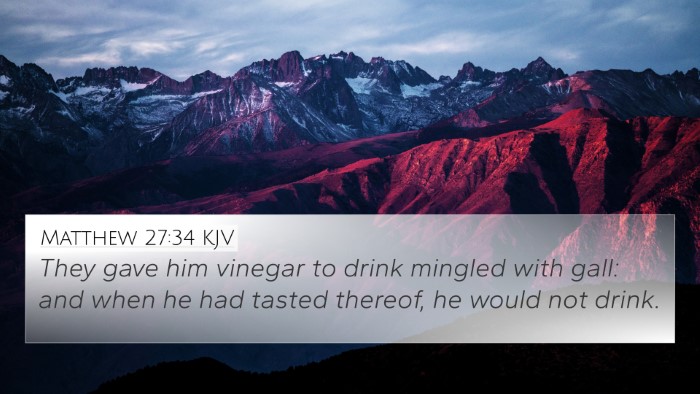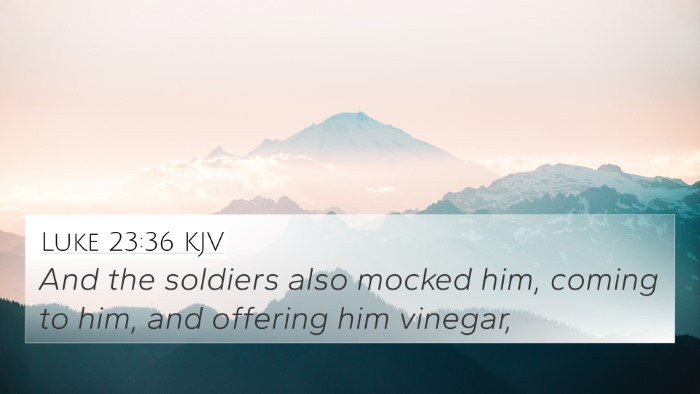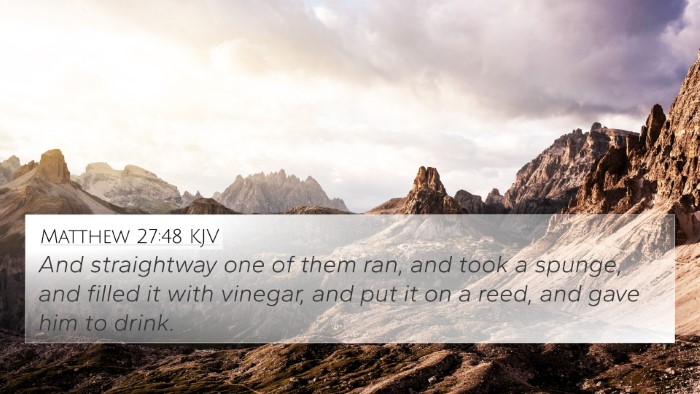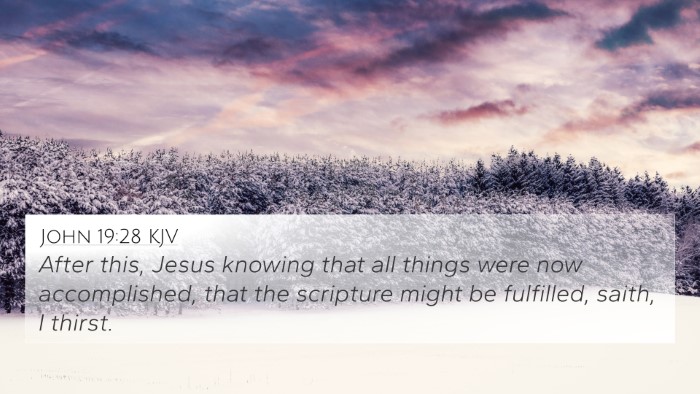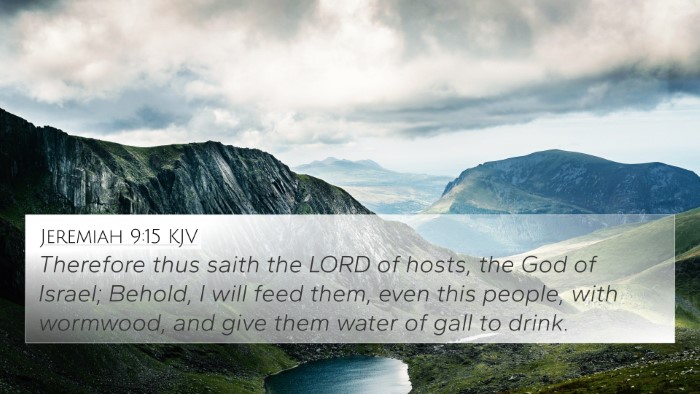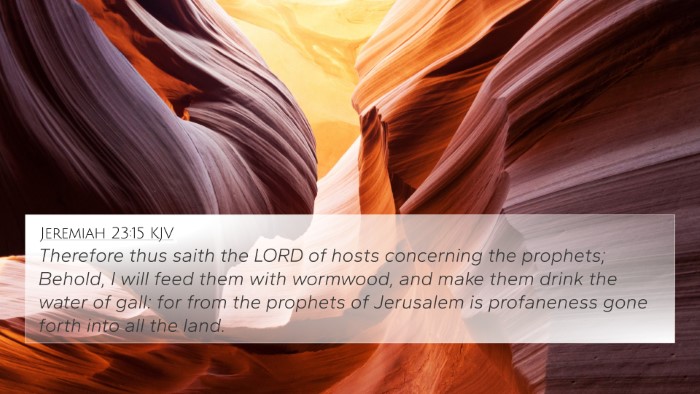Understanding Psalms 69:21
Psalms 69:21 states: "They put gall in my food and gave me vinegar for my thirst." This verse encapsulates a profound moment of suffering and prophetic significance, reflecting not only personal anguish but also foreshadowing the experiences of Christ at His crucifixion. Commentaries provide deep insights into the layers of meaning contained within this text.
Commentary Summary
Matthew Henry: Matthew Henry emphasizes the dual nature of this verse, illustrating both the psalmist’s personal distress and its messianic implication. He notes that the "gall" signifies bitter suffering while "vinegar" represents mockery. This suffering serves as a prelude to the greater suffering that Jesus would endure, confirming the prophetic context of the Psalm. Henry also highlights the deep emotional torment behind the psalmist’s words, seeing in them a cry for divine justice amidst betrayal.
Albert Barnes: Albert Barnes interprets this verse within the framework of the psalmist's lament. He points out that gall, known for its bitterness, symbolizes the toxic treatment received by someone in a position of sorrow and need. Barnes connects this with the actions of those who surrounded Jesus, offering vinegar when He was thirsty. The verse illustrates not just historical suffering but also spiritual rejection, which resonates through the ages, particularly in the portrayal of Christ's Passion.
Adam Clarke: Adam Clarke offers a comprehensive breakdown of the terms used in this verse. He explains that "gall" and "vinegar" are not only literal but also metaphorical representations of the world's cruelty toward the afflicted. Clarke relates this to the broader theme of divine suffering and human response, suggesting that such experiences forge a connection that transcends time, echoing through both the Old Testament and New Testament narrations. He comments on the fulfilling prophecy aspect, where the actions described were later seen in the Passion narrative concerning Christ, drawing a living link between the two Testaments.
Cross-References for Psalms 69:21
To fully appreciate the depth of Psalms 69:21, it is helpful to investigate its inter-biblical connections. Below are ten significant cross-references:
- Matthew 27:34: "They gave Him wine to drink mixed with gall; and after tasting it, He would not drink it." This directly reflects the actions leading up to Christ's crucifixion.
- John 19:28-30: The fulfillment of thirst during the crucifixion and the declaration of "It is finished," strongly ties back to the psalmist's lament.
- Zechariah 12:10: Describes a mourning for the one they have pierced, aligning with the themes of sorrow present in Psalms 69.
- Revelation 7:17: "For the Lamb in the midst of the throne will be their shepherd, and He will guide them to springs of living water," evoking the contrast between physical thirst and spiritual fulfillment.
- Psalm 22:15: "My strength is dried up like a potsherd, and my tongue sticks to my jaws; you lay me in the dust of death," representing a similar theme of suffering and thirst.
- Matthew 5:6: "Blessed are those who hunger and thirst for righteousness, for they shall be satisfied," contrasting the bitterness faced by the psalmist.
- Luke 23:36: "The soldiers also mocked Him, coming up and offering Him sour wine," again paralleling the experience of ridicule faced by Jesus.
- Isaiah 53:3-5: "He was despised and rejected by men; a man of sorrows and acquainted with grief," relating to the overall context of rejection in Psalms 69.
- Philippians 2:7-8: Discusses Christ's humility and suffering, reinforcing the connection to the themes of the Psalm.
- Hebrews 5:8: "Although He was a son, He learned obedience through what He suffered," emphasizing that suffering is integral to the identity of both the psalmist and Christ.
Thematic Connections
The verse serves to bridge significant themes present within the Bible, particularly focusing on suffering, rejection, and the divine handling of human grief. The experiences narrated in Psalms 69 resonate deeply with the sufferings of Christ, as seen in the New Testament.
Application and Reflection
Readers are encouraged to reflect on the implications of this verse in their own lives—how one might face mockery or pain while seeking righteousness. By understanding the depth of the suffering in this verse, individuals can better appreciate the redemptive suffering of Christ. This encourages the faithful to bear their trials in hopes of ultimately being guided toward living waters, as promised in Revelation.
Conclusion
In summary, Psalms 69:21 is rich in meaning, serving as both a personal lament and a prophetic foreshadowing of Christ's suffering. Engaging with public domain commentaries deepens our understanding and appreciation of this verse, connecting it through various scriptural cross-references that highlight the continuity of God's plan throughout the Bible. Through these insights, we discover how interconnected the scriptures are, enabling a comprehensive view of theological themes related to suffering and divine providence.
Further Study
For a more profound study, consider utilizing tools for Bible cross-referencing like a Bible concordance or a Bible cross-reference guide. Understanding how to utilize cross-reference Bible study methods can illuminate connections like the one between Psalms 69 and the New Testament narratives.



